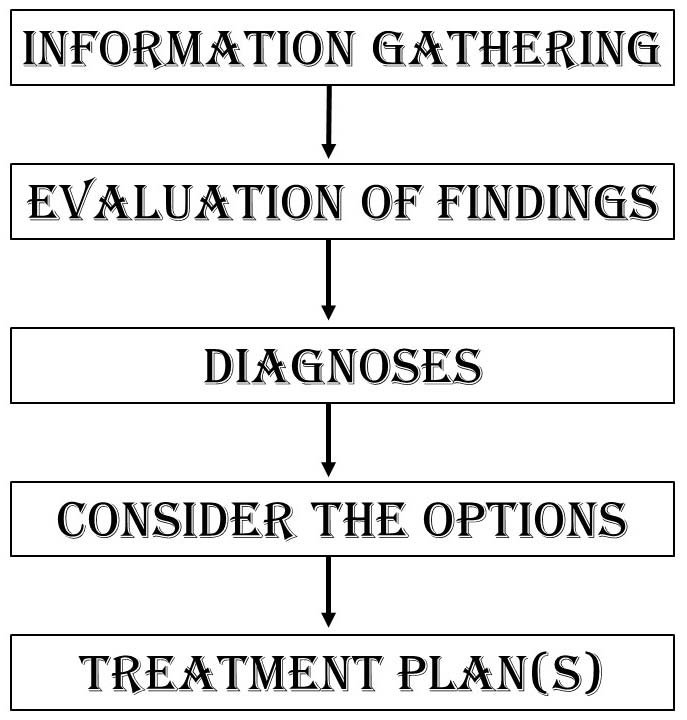When developing a treatment plan, we have several goals in mind – both short and long term. Treatment plans and rationales vary from patient to patient. One patient may have a perfectly healthy mouth, but merely want to address some esthetic concerns. Another patient may have structural issues and/or diseases that are slowly progressing. Yet another may have more serious problems or pain that prevents them from being able to function properly.
The treatment plan is the plan of action to handle these things. It includes the type of treatment recommended, an expected timeline for completion (or phases, if it will be done over a period of time), fees, payment expectations, and an explanation of all of the benefits, options and risks involved. In essence, it is a road map that directs us towards our stated goal.
Using information obtained from the patient history, the clinical examination and the diagnostic tests, the doctor assimilates all the pertinent information in order to arrive at diagnoses. This ability to interpret data is one of the key differences between experts and novices. It’s important to take sufficient time to do a thorough diagnostic evaluation and to discuss in depth all of your needs, desires and expectations.
We will always give you OPTIONS, not just one course of action.
There are several factors involved when deciding on the best treatment plan for an individual patient: physical, emotional, mental, and financial. Every patient is different and, sometimes, their treatment plans can be limited by one of the above factors. If a patient has physical health problems like back issues that prevent them from being able to sit in the chair for long periods of time, we may adjust and schedule shorter, more frequent appointments with breaks in between. Emotions also come into play. For some people, their teeth are a huge source of self-consciousness or social anxiety. Some patients may even have jobs or hobbies that rule out certain treatments – for instance, someone who plays a trumpet can’t wear anything removable. Someone who speaks publicly a lot may not be ok with wearing a denture for fear of it slipping out in the middle of a speech. On the flip side, other patients may be so used to suffering with their dental problems that they don’t even understand why they need treatment. Lastly, many patients have financial concerns regarding paying for dental treatment. They’re used to the health insurance paying for whatever medical care they get, and it often shocks people when they learn that dental insurance, only pays a pittance, if at all, unless all they ever need are cleanings and an occasional filling.
 Treatment planning always begins with data collection. We begin by getting a detailed medical and dental history so we can better understand you as a person. We also go over your chief complaints to understand what your objectives are with dental treatment. Next comes a clinical examination and X-rays to help identify problems that cannot be seen with the naked eye. Sometimes, we also make models or digital scans of your teeth so we can look at them from different angles.
Treatment planning always begins with data collection. We begin by getting a detailed medical and dental history so we can better understand you as a person. We also go over your chief complaints to understand what your objectives are with dental treatment. Next comes a clinical examination and X-rays to help identify problems that cannot be seen with the naked eye. Sometimes, we also make models or digital scans of your teeth so we can look at them from different angles.
Based on all this information, we slowly develop a clear picture of what your problems are. That’s when we begin to lay out the various options as to what is possible and what can be done to address these issues. We take many factors into consideration, such as your health, your lifestyle, your habits, and any anatomical limitations that you might have. After that, we devised a treatment plan which is tailor-made for you, and not a one-size-fits-all option that can be applied to every single patient.
Sometimes, the course of treatment can include breaks, where we can put you in a holding pattern for a while between phases of treatment. This is sometimes one to space out payments, especially when financial considerations are an issue.
We don’t ever pressure you to make any decisions right away, because sometimes it is a lot of information to take in. You will leave our office with a written treatment plan and an understanding of all the options and factors involved.
If you are in need of dental treatment, we invite you to come in for a complimentary consultation to find out what your options are, so you can make an informed decision as to which option is best for you.

